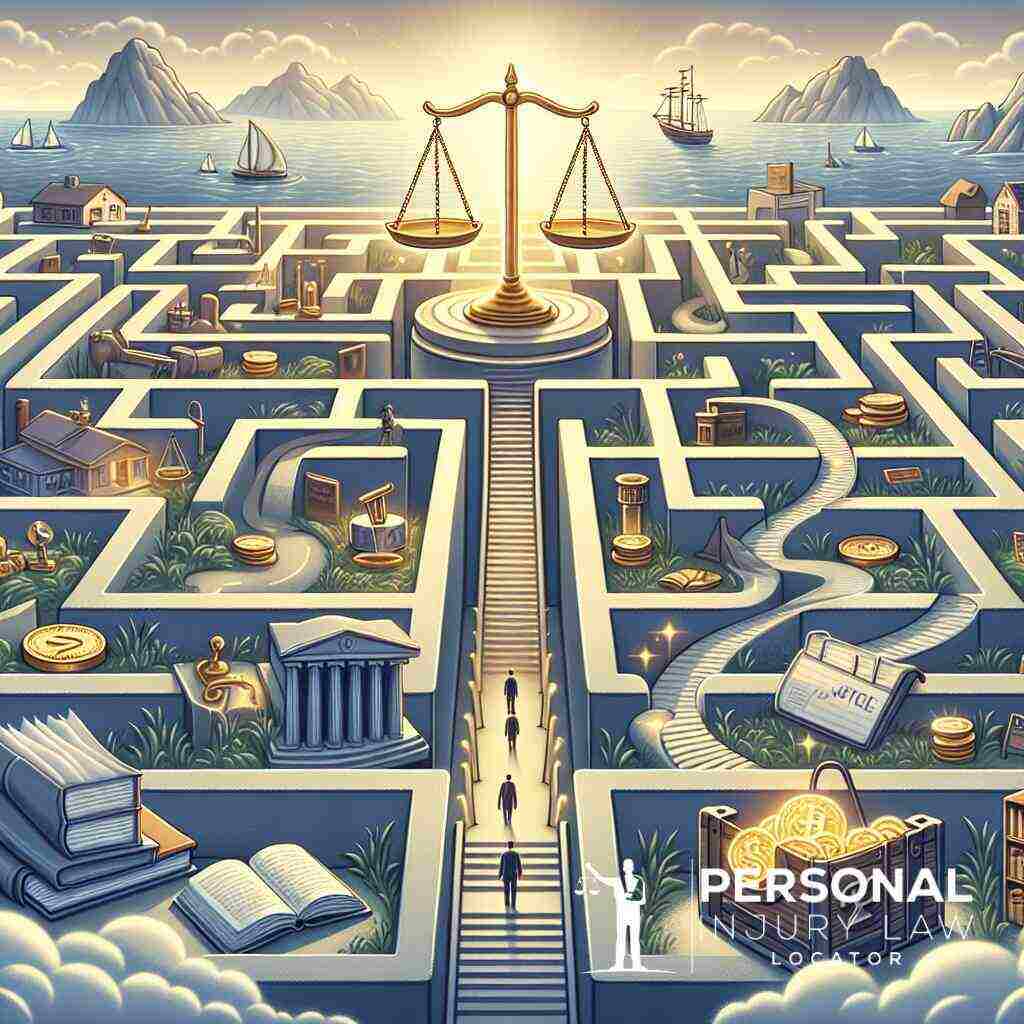 Posted On: 06/03/2024
Posted On: 06/03/2024Navigating the Path to Your Personal Injury Lawyer
Understanding the Importance of Personal Injury Law
Personal injury law is a fundamental aspect of the justice system, offering protection and compensation to those who have suffered injuries due to the actions or negligence of others. It encompasses a broad range of scenarios including car accidents, medical malpractice, and workplace injuries. By understanding the importance of personal injury law, individuals can grasp the significance of seeking legal assistance promptly. This area of law not only aims to cover medical bills and lost wages but also addresses the emotional distress and physical suffering experienced by the injured party. The knowledge of personal injury law enables individuals to identify when their rights have been violated, and how they can legally pursue compensation.
Finding the Right Personal Injury Lawyer Near You
When looking for a personal injury lawyer, the aim is to find a legal professional who is not only experienced and skilled but also compassionate and understanding of your situation. It’s essential to conduct thorough research, seeking recommendations, and reading reviews to find a lawyer who specializes in cases similar to yours. A proficient personal injury lawyer will navigate the complexities of your case, dealing with insurance companies and opposing lawyers to ensure your voice is heard and your damages adequately compensated. For those in search of a reputable personal injury lawyer, Finding Top Personal Injury Lawyers Near Me provides valuable insights into sourcing the best legal representation available, ensuring that your case is handled with the expertise it deserves.
Preparing for Your First Consultation
The initial consultation with a personal injury lawyer is a critical step in your legal journey. To make the most of this meeting, preparation is key. Gather all relevant documents and evidence related to your case, including medical records, accident reports, and any correspondence with insurance companies. This documentation will provide your lawyer with a comprehensive overview of your situation, enabling them to assess the merits of your case accurately. Coming prepared with a clear narrative of events and any questions you have can significantly enhance the productivity of the consultation. Understanding what to expect and how to prepare can be further explored through insights on Preparing for Consultation with Injury Attorney, ensuring you are fully equipped for your first legal consultation.
The Initial Consultation: Laying the Groundwork for Your Case
What to Bring: Documentation and Evidence
When approaching your first consultation with a personal injury lawyer, it’s essential to come prepared with all relevant documentation and evidence. This can include anything from photos of the incident scene to medical bills and reports detailing your injuries. Such documentation plays a crucial role in establishing the foundation of your case. The Personal Injury Law Locator emphasizes the importance of being thorough and organized with your evidence. Gathering comprehensive details can significantly influence the direction and potential success of your personal injury claim. Remember, every piece of evidence can help your attorney build a stronger case on your behalf.
Communicating Your Story Clearly
The ability to communicate your story clearly and concisely cannot be overstated. During the initial consultation, your personal injury attorney will need to understand the series of events that led to your injuries as well as the impact these injuries have had on your life. It’s not just about recounting facts,it’s about painting a picture that encompasses both the physical and emotional tolls. This clarity helps your attorney assess the case’s strengths and weaknesses. Detailed narratives enhanced with evidence can pave the way for effective legal strategies. With the guidance from Personal Injury Law Locator, one can learn more about how to communicate effectively with your personal injury lawyer, ensuring that your story is heard and understood.
Understanding the Role of Your Personal Injury Attorney
Understanding the role of your personal injury attorney is paramount. A personal injury lawyer does not just represent you in court. They are your advisor, advocate, and legal strategist. From investigating the claim and negotiating with insurance companies to advocating for your best interests in court if necessary, your attorney plays a multifaceted role. They navigate the complex landscape of personal injury law to seek justice and compensation for your losses. Familiarizing yourself with what an injury attorney does? provides valuable insights, empowering clients to fully leverage their legal representation. A deep understanding fosters a productive attorney-client relationship, enabling better communication and trust throughout the legal process.
Building a Strong Attorney-Client Relationship
Questions to Ask Your Personal Injury Lawyer
A solid attorney-client relationship begins with transparent communication from the very start. When meeting your personal injury lawyer, it’s essential to ask targeted questions that illuminate their experience, approach to your case, and the potential paths forward. Inquire about their specialization in personal injury law, years of experience, and success rate with cases similar to yours. Understanding their strategy for your case, including how they plan to deal with the insurance companies, can provide insight into their legal acumen and how they intend to achieve a favorable outcome. Additionally, asking about the communication process and frequency of updates sets a clear expectation for your working relationship.
Setting Expectations on Communication and Updates
Open lines of communication are crucial in building trust and ensuring a smooth attorney-client relationship. During your initial consultation, discuss how the lawyer prefers to communicate, whether through email, phone calls, or other means. It is also important to set a regular schedule for updates on your case, whether there are significant developments or not. This helps in maintaining transparency and ensures that you’re always informed about the progress of your personal injury claim. Establishing these expectations early on can prevent misunderstandings and foster a positive working relationship with your personal injury lawyer.
Confidentiality and Trust
Confidentiality underpins the attorney-client relationship. Any discussions you have with your lawyer are protected, allowing you to be open and honest about your case without fear of repercussion. This trust enables your lawyer to build a more compelling case on your behalf since they’ll have all the necessary information. Reinforce the importance of confidentiality at the start and ensure that you fully understand the scope of this aspect of your relationship. By establishing a foundation of trust and mutual respect, you empower your legal team to represent you effectively, aligning both parties towards a common goal of achieving justice and fair compensation for your injuries.
Understanding the Legal Landscape of Personal Injury Claims

The Basics of Personal Injury Law
Personal injury law, designed to protect those injured due to someone else’s negligence or deliberate actions, is a cornerstone of civil law. It encompasses a wide range of cases, from slip and fall incidents to complex medical malpractice or product liability claims. Central to personal injury law is the concept of negligence, which requires proof that the defendant owed a duty of care to the plaintiff, breached that duty, and caused harm as a result. Understanding these basics is crucial for anyone navigating a personal injury claim, as it sets the groundwork for what needs to be proved in court. For a comprehensive understanding, the Basics of Personal Injury Legislation provide essential insights into the legal frameworks governing these cases.
Navigating Insurance Claims and Settlements
Dealing with insurance companies is an inevitable part of most personal injury cases. These companies often aim to minimize the compensation paid out to claimants. Successfully navigating insurance claims and settlements demands a strategic approach, starting with a thorough understanding of the policy details and the extent of your coverage. It’s important to communicate with insurance adjusters clearly but cautiously, as they are trained to protect the insurer’s interests. Documenting all interactions and standing firm on the compensation you deserve are key strategies. Additionally, a seasoned personal injury lawyer can provide invaluable guidance, leveraging their expertise to negotiate fair settlements that cover all your damages, including medical bills, lost wages, and emotional distress.
The Timeline of a Personal Injury Lawsuit
The timeline of a personal injury lawsuit can vary greatly depending on the complexity of the case, the jurisdiction, and the parties involved. Generally, it begins with an incident that causes personal injury, followed by the filing of a complaint and engagement of a personal injury lawyer. The discovery process, where both sides gather evidence, comes next and can take several months. Settlement negotiations may occur at any stage, often resolving the case before it goes to trial. However, if a settlement isn’t reached, the case will proceed to trial, where a judge or jury will determine the defendant’s liability and the compensation amount. The entire process can take anywhere from a few months to several years. Gaining an understanding of this timeline can set realistic expectations for plaintiffs and help them prepare for the journey ahead. For those looking into the specific phases of a lawsuit, exploring the Navigating Through Personal Injury Lawsuit Process can offer more detailed insights into what each stage involves and the potential challenges that may arise.
The Economic Side of Injury Claims
Understanding Attorney Fees and Contingency
Entering the realm of personal injury claims, one of the first matters to consider is the structure of attorney fees, particularly the contingency fee model. This model is a staple in personal injury law, where the lawyer’s payment hinges on the successful resolution of your case. Under this arrangement, attorneys typically receive a percentage of the settlement amount or court award rather than an upfront fee. This system aligns the lawyer’s interests with yours, incentivizing them to secure the highest possible compensation for you.
However, it’s crucial to have a clear conversation with your personal injury lawyer about what the contingency fee percentage will be and understand other potential costs that could arise during the case. These could include expenses for gathering evidence, court filing fees, and costs related to depositions of expert witnesses. Understanding the attorney’s fee structure is not only about being informed,it’s about setting a clear financial expectation from the outset of your legal journey.
Managing Medical Bills and Treatment Costs
The aftermath of an injury often comes with mounting medical bills and ongoing treatment costs, which can be overwhelming for the injured party. A personal injury claim aims to recoup these costs, but managing them until a settlement is reached or a court awards damages is a significant challenge for many. It’s essential to keep meticulous records of all medical treatments, bills, and related expenses from the moment you’re injured. These documents are crucial pieces of evidence for substantiating your claim.
Moreover, communicate with your healthcare providers about your situation. Some may offer deferred payment plans or agree to wait for the settlement of your injury claim before requiring payment. Additionally, your personal injury lawyer can guide you through the process of dealing with medical bills, including exploring avenues such as medical liens which allow you to receive the necessary treatment without immediate out-of-pocket payments.
Negotiating Settlements Effectively
Negotiating an insurance settlement is a complex, nuanced process requiring skilled navigation to avoid undervaluation of your claim. The initial offer from an insurance company is often lower than what your claim is worth. Having an experienced personal injury lawyer who understands how to communicate effectively with insurance companies is invaluable. They can challenge lowball offers by presenting a well-prepared case supported by solid evidence, including medical records and expert testimony.
Your attorney plays a crucial role in negotiating a fair settlement that covers not only your immediate medical costs but also factors in lost wages, future treatment expenses, and compensation for emotional distress. It’s also important to have patience during this process. Insurance companies may employ delay tactics to pressure you into settling for less. Trust in your legal team’s strategy and allow them the time needed to secure a settlement that accurately reflects the true value of your claim.
Gathering and Organizing Your Evidence
Collecting Accident Reports and Medical Records
Having a solid foundation of evidence is crucial in any personal injury claim. The collection of accident reports and medical records serves as the backbone of your case. When you’re preparing to discuss your case with a personal injury lawyer, it’s essential to gather any police or incident reports that detail the event, as well as all medical documentation related to your injuries. This includes initial emergency care reports, diagnoses, treatment plans, prescriptions, and any follow-up visits. These documents not only establish the fact of your injury but also the direct link between the incident and your sustained injuries. Your legal team can use this evidence to demonstrate both the severity of your injuries and the other party’s liability.
Documenting Property Damage and Personal Injuries
In addition to medical records, documenting any property damage and the physical injuries you’ve suffered is vital. Take photographs of your injuries at different stages of your healing process, and keep a diary of your physical and emotional recovery. Document the damage to your property with photos and repair estimates as well. This type of evidence adds a concrete dimension to your claim, illustrating not just the physical cost but also the psychological impact. Such documentation can be particularly persuasive in proving to insurance companies and courts the extent of your losses, reinforcing the narrative told by your medical records and accident reports.
Working with Medical Professionals to Prove Injury and Treatment
Your interaction with medical professionals plays a pivotal role in substantiating your personal injury claim. It’s not only about receiving treatment-your medical providers are also key witnesses to the nature and extent of your injuries. Ensure that you follow their advice, attend all appointments, and keep a detailed account of your symptoms and limitations as you recover. In some cases, your personal injury lawyer may also advise you to see a specialist who can provide further evidence of your injuries and future medical needs. This interaction is not just about healing but also building a compelling, evidence-based case that supports your claim for compensation. Engaging with medical professionals who can document your injuries in detail will ensure that the insurance company or court understands the full impact of your accident, bolstering your position in negotiations or litigation.
By meticulously gathering and organizing your evidence, including accident reports, medical records, documentation of property damage and injuries, and working closely with medical professionals, you build a strong foundation for your personal injury claim. This preparation enables your legal team to craft a convincing argument for your compensation, ensuring all facts are present and accounted for, making your claim that much more compelling.
Strategizing for Success in Personal Injury Claims
Developing a Legal Strategy with Your Lawyer
The initial step towards achieving a successful outcome in a personal injury claim involves developing a robust legal strategy with your lawyer. This strategic planning begins with a thorough review of all case-related documents, including medical records, accident reports, and any communications with insurance companies. Your personal injury lawyer will assess the strengths and weaknesses of your case, considering the Understanding of Negligence in Injury Claims to tailor a strategy that aligns with your specific circumstances. An effective legal strategy not only guides the direction of your case but also anticipates the actions of the opposing side, ensuring you’re prepared for various scenarios. Discussing potential strategies with your attorney helps set realistic expectations and fosters a collaborative attorney-client relationship, pivotal for navigating the complexities of personal injury law.
Anticipating Challenges and Building a Case
Successfully navigating a personal injury claim necessitates anticipating challenges and erecting a case resilient enough to withstand them. Your legal team, leveraging their expertise and knowledge of personal injury law, will identify possible hurdles such as disputes over liability or the severity of your injuries. They will work diligently to mitigate these issues by solidifying your claim with undeniable evidence, such as detailed medical records, expert testimonies, and an impeccable documentation of damages. In personal injury law, preparedness is akin to fortification. By proactively addressing potential objections and bolstering your claim, your lawyer ensures that your case is positioned for the best possible outcome. This phase is critical, as it involves detailed legal and factual analyses to construct a narrative that convincingly argues for your entitlement to compensation.
The Role of Expert Witnesses and Testimonies
Expert witnesses and testimonies play an indispensable role in the success of many personal injury claims. These experts, ranging from medical professionals to accident reconstructionists, provide authoritative insights that can substantiate claims about the cause of the accident, the extent of injuries, and the impact on the victim’s life. Your personal injury lawyer will determine the type of expert testimony that may be beneficial to your case and orchestrate the integration of this testimony into your legal strategy. This might involve having a medical expert explain the complexity of your injuries or an economist to assess the financial impact of long-term disability. The utilization of expert witnesses and testimonies can significantly enhance the persuasiveness of your claim, establishing a firmer grounding for your demand for compensation. These testimonies not only provide clarity and credibility to your assertions but also augur a deeper understanding of your case’s nuances among jurors or insurance adjusters, thereby, playing a pivotal role in the negotiation and litigation processes.
Looking Ahead: What to Expect After Hiring a Personal Injury Lawyer
Timeline and Milestones of Your Case
Once you’ve entrusted your personal injury case to a skilled attorney, a structured timeline begins to unfold. Initially, your legal team will be engaged in the collection of evidence, including accident reports and medical records, to build a robust foundation for your claim. A pivotal aspect during this period is the Explaining Structured Settlements in Injury Cases, which can significantly impact your financial recovery strategy. Throughout this phase, it’s essential to stay informed about the major milestones:
- Discovery Phase: Both sides exchange information and evidence. This can last several months, depending on the complexity of your case.
- Mediation and Negotiation: Before going to trial, there’s often an attempt to settle the case. Your lawyer will negotiate with the aim of reaching an agreement that’s in your best interest.
- Trial Preparation: If mediation doesn’t result in a settlement, your attorney prepares for trial. This involves crafting persuasive arguments, preparing witnesses, and strategizing for courtroom presentation.
- Trial: The length and structure of the trial can vary, but this is where the fate of your lawsuit is ultimately decided.
- Verdict and Appeals: After the trial, a verdict is rendered. If the outcome is unfavorable, your lawyer may discuss the possibility of an appeal.
Preparing for Mediation or Trial
Preparation is key when heading into mediation or trial for your personal injury claim. Your attorney will guide you through what to expect, how to present your case, and the importance of maintaining a calm and collected demeanor throughout proceedings. In mediation, the goal is to reach an agreeable settlement through negotiation facilitated by a third-party mediator. It requires a clear understanding of your desired outcome and the minimum settlement you would accept.
For a trial, thorough preparation involves reviewing all collected evidence, rehearsing testimonies, and strategizing on how to effectively combat the opposition’s claims. Here, your attorney plays a vital role in ensuring that you’re mentally and emotionally ready to face the rigorous demands of a courtroom setting. This stage is as much about resilience as it is about the meticulous presentation of your claim.
Understanding Possible Outcomes and Appeals
Navigating a personal injury lawsuit means being ready for various potential outcomes. Your attorney will discuss possible scenarios, from winning a substantial award to facing a less favorable verdict. It’s crucial to have realistic expectations and understand the factors that might influence the final outcome. In some cases, even with a strong claim, the decision may not be as expected.
In such instances, your lawyer will assess the feasibility and potential benefits of filing an appeal. An appeal is not about re-arguing your case but rather focusing on possible legal errors that were made during the trial which might have affected the verdict. Understanding the appeals process is vital, as it can be lengthy and requires a significant commitment of time and resources.
Facing the journey of a personal injury claim can be daunting, but with the right legal representation, you can navigate this path more confidently. Knowing what lies ahead after hiring a personal injury lawyer prepares you for each phase of the process, allowing you to make informed decisions about your case and ultimately, your future.
Concluding Thoughts: Empowering Your Journey towards Justice

The Importance of Patience and Persistence
The journey through a personal injury claim is often a marathon, not a sprint. It’s essential to approach this process with both patience and persistence. Understanding that legal proceedings can be lengthy and may sometimes feel overwhelmingly complex is key to maintaining your resolve. Successful claims are often the result of continuous effort and the unwavering determination of both the injured party and their legal representative. It’s this perseverance that can turn the tide in what might initially seem like a daunting battle against insurance companies and opposing legal teams. Remember, victories in personal injury law are not just about immediate gratification but rather about the long-term rectification of wrongs and recognizing the tenacity of the human spirit in the face of adversity.
Staying Informed and Engaged with Your Case
Staying informed and actively engaged with your case is crucial. This involves regular communication with your personal injury lawyer, keeping abreast of developments in your case, and understanding the implications of these developments. It’s not uncommon for personal injury law to seem intricate and confusing, but a good attorney will help demystify the process, guiding you through each step with clarity and purpose. By staying informed, you can make educated decisions about your case, influencing its direction and outcome. This active involvement also reinforces the collaborative nature of the attorney-client relationship, fostering a partnership that is essential for navigating the personal injury claim process effectively.
The Impact of a Successful Personal Injury Claim on Your Life
The resolution of a personal injury claim can have a profound impact on your life. Beyond the immediate financial benefits of compensation for medical bills, lost wages, and other expenses, a successful claim can bring a sense of justice and closure to a challenging chapter of your life. It’s a validation of your experience, the hardships you’ve endured, and the resilience you’ve shown. This victory can also have a ripple effect, potentially leading to changes in policy or practice that prevent others from suffering similar injuries. Ultimately, a successful personal injury claim can provide not just economic relief but also a path to emotional and psychological healing, allowing you to move forward with renewed strength and confidence.
The journey through a personal injury lawsuit is fraught with challenges, but with the right legal representation, patience, and proactive engagement, it is possible to achieve a positive outcome. This process not only seeks to compensate the injured party but also works towards upholding justice and protecting future individuals from harm. Through this journey, individuals are reminded of the strength found in perseverance, the value of informed participation, and the profound impact a successful claim can have on restoring balance and hope to their lives.
Frequently Asked Questions
Question: How do I prepare for my initial consultation with a personal injury lawyer from your network?
Answer: Preparing for your initial consultation with a personal injury lawyer through Personal Injury Law Locator involves gathering all relevant documentation to your case, including medical records, accident reports, and any communication with the insurance company. This helps our seasoned lawyers to accurately evaluate your personal injury claim, understand the circumstances of your case, and devise a legal strategy tailored to your specific needs. Ensuring you have a clear narrative of events and any questions you may have will significantly enhance the productivity of the consultation, setting a solid groundwork for your case.
Question: In the blog post ‘How to Talk to Your Personal Injury Lawyer,’ it is mentioned to ask targeted questions during the first meeting. What are some examples of these questions I should ask when meeting a lawyer from Personal Injury Law Locator?
Answer: When meeting with a personal injury lawyer from Personal Injury Law Locator, it’s critical to ask questions that shed light on their experience and approach to cases similar to yours. Examples include inquiring about their specialization within personal injury law, the number of cases they have successfully settled or won at trial, their approach to dealing with insurance companies, and how they will communicate and provide updates to you throughout your case. These questions help establish a clear understanding of what to expect from your legal representation and how they can assist you in achieving a favorable outcome for your personal injury claim.
Question: Can Personal Injury Law Locator help me understand how attorney fees and contingency fees work for my personal injury case?
Answer: Absolutely, at Personal Injury Law Locator, we ensure our clients fully understand the attorney fees and contingency fee basis that governs our legal services. Our network of experienced personal injury lawyers works on a contingency fee basis, meaning you won’t pay any upfront fees. Payment for our services is only required if we win your case or achieve a settlement on your behalf. This approach aligns our interests with yours, incentivizing us to secure the best possible outcome. We’re transparent about any costs you might be responsible for, ensuring you’re informed every step of the way and can trust us to handle your personal injury lawsuit efficiently and ethically.
Question: How does Personal Injury Law Locator ensure the right match between injured parties and personal injury attorneys?
Answer: Personal Injury Law Locator prioritizes matching each client with the most suitable personal injury attorney for their specific case requirements. By leveraging our extensive network of legal professionals, adept in various aspects of personal injury law, from car accidents and medical malpractice to wrongful death and workplace injuries, we consider the specifics of your case, your geographical location, and the type of injury sustained. This meticulous matching process ensures you’re paired with a personal injury lawyer near you who not only understands the intricacies of your case but also has a proven track record of securing favorable verdicts and settlements for clients in similar situations.
Question: What steps should I take if I’m not satisfied with the outcome of my personal injury claim through Personal Injury Law Locator?
Answer: If you’re not satisfied with the outcome of your personal injury claim, Personal Injury Law Locator encourages open and honest communication with your assigned personal injury attorney to discuss your concerns and explore potential next steps. This may include reassessing the strategy of your case, considering alternative legal avenues such as filing an appeal if applicable, or mediation and further negotiation with the insurance company. Our goal is to ensure your utmost satisfaction with the legal process and the resolution of your case, providing support and advice every step of the way to achieve the compensation you rightfully deserve.


